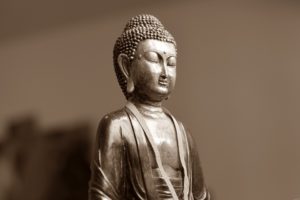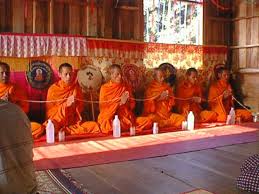The Buddhists do not extinguish suffering by lighting incense and candles and making pledges to supposedly supernatural things. One uniqueness of Buddhism is that it teaches moral behavior without reference to heaven and hell. Buddhism advocates impermanence of all existences, and it does not demand blind faith from its followers. The notion of incurring the displeasure of an almighty creator, which many religions instilled in the minds of their followers is unknown in Buddhism.
Man, since time immemorial, when faced with the forces of nature like rain, wind, thunder, lightning or natural calamities like earthquakes, volcanic eruptions, or endemic diseases, will prostrate himself on the ground, begging protection from unknown, non-existing and almighty powers. The Buddhists did not do this and still do not do it today.
Buddhists do not believe the Buddha was a god.
They know the Buddha is higher than any god. They also know that wood or metal statues are only symbols representing their beliefs. They do not believe the Buddha is in the statues or around them, just like Taoists having the ying-yang symbol, Sikhism having the sword, and Christianity the fish and the cross. 
A Buddhist doesn’t offer flowers in the temple with the hope of gaining the favor of the Buddha, or expecting the Buddha to take him to heaven for eternal life, nor does he ask Him to forgive his sins. He does so because he feels so much obliged to his teacher. Worshipping before a statue of the Buddha is not an act of idolatry. It is a method of veneration. Buddhism doesn’t provide much room for rituals and ceremonies. It is not esoteric because it doesn’t have secrets and hidden meaning. Buddhists do not chant magic rituals to win the favor of gods and to ensure good fortune.
Buddhists do not consider chanting to be a prayer.
To them, it is a mental health training just as one follows the rules of physical hygiene. There is nothing superstitious about it. Why should non-Buddhists be unhappy about it? Why do people read poems aloud? Is it a sort of ritual? When a Buddhist does chanting, he doesn’t ask someone to save him from evils nor is he hoping to be given a place in heaven. His chanting is done for learning, teaching or re-memorizing the discourse, as during the Buddha’s time there was no paper to record the discourse. You either chant it to remember it or you forget it forever. Ideally, one studies the discourses, teach them to others, reflects on their philosophical points, chants them regularly and practices it in daily life. Ceremonies, with local customs added, are not necessary but they satisfy certain religious emotions and the needs of the average guy on the street. Buddhism has been able to stand firm and lasted up to now partly because of those rituals. Rituals help to protect religion and also helps it to grow.





